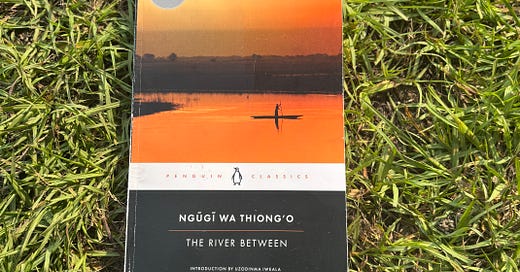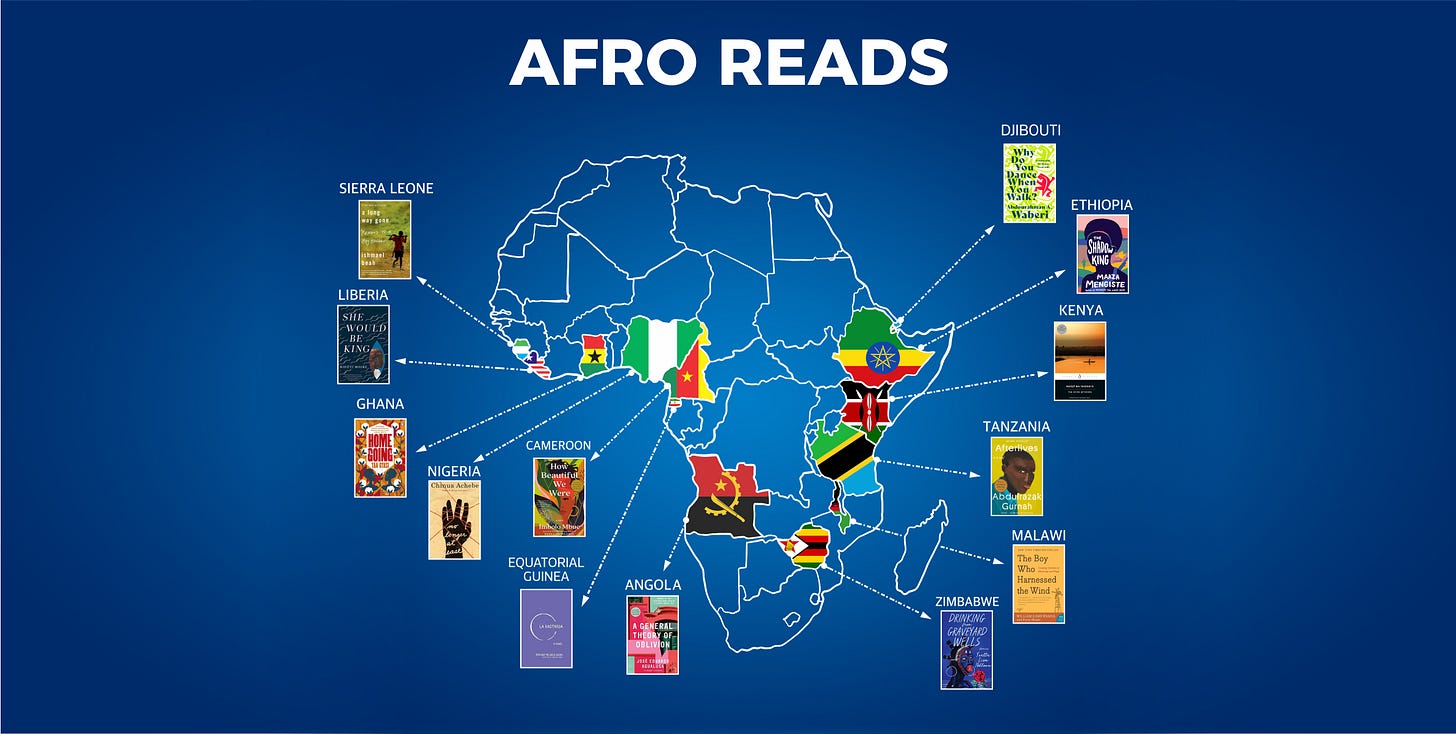An African Classic: The River Between
Language, any language, has a dual character: it is both a means of communication and a carrier of culture - Ngũgĩ wa Thiong'o Book review #8 out of 54
Afro Reads is making its way across the continent! This our 8th country out of the 54. Below is a sneak peek of potential books that will be read and reviewed. For those who are just joining, please check out the former reviews, my bookcast, and consider joining us for our community reading via Substack in July!!
As the saying goes, never judge a book by its cover. In this case I’ll replace the word ‘cover’ with ‘size’. Though slender, this novel is enriched with symbolism and critical of the times when Kenya was remolding themselves in their post independence state.
When one mentions the writings of Thiong’o, we hear of “Petals of Blood’, ‘Wizards of the Crow”, and his play, “I Will Marry When I Want’.
This book was introduced to me over a year ago. This is the first book I have read by an East African author — a Kenyan author. Many novels have shaped the west coast of the continent and I feel the study of novels toward the East may slip through the cracks.
This book was written to describe a period of time of post colonialism. There were still traditions within the tribes such as the celebration of circumcision. But here comes the dilemma, is one still able to practice tradition and still follow the missionaries religion of Christianity? Another thing, what is the difference between the ancestors who were seers and the prophet Isaiah in the Bible?
For there was a seer in the land that predicted the coming of the white men. It was not mere hearsay of them only arriving in the cities, for one day, they will spread their ‘magic’ to the hills.
The hills, Kameno and Makuyu are occupied by the people who sleep like lions. I could be wrong, but I believe the author is saying the people are ‘sleeping’ in a time when they should be awakening up to the changes going on around them.
The land is divided by the river, Honia, who signifies a river that never changes. Maybe if the two villages meet in the middle or merge together they can create change for generations to come.
In the beginning we meet one of the main characters as a young boy, Waiyaki. The author reveals his position in the story, for he is described in such a way that we know that he may not be the oldest in terms of years, but his stature and mannerism are those of his fathers. He has a calling that he must fulfill.
Then there is Joshua, he has a name of the bible, which I think signifies his dedication to the religion of Christianity. He, as his wife went through circumcision in their youth, but have turned against their old beliefs and took on a new faith. Their daughters were also raised in this new faith, but one rebels. Her actions will be known across by those far and wide. The conclusions of her actions will be seen as an omen, that you cannot belong to two beliefs at once.
Waiyaki, who received education from the missionaries, continues to do what his father, Chege, insist that he must do. He brings new ideals of schools. Yes, this is the white man’s education, for they are all over now and there is no use in one sleeping as if they do not exist. These schools will be different than those of the missionaries. You do not have to be a Christian in order to achieve outside knowledge.
****
In conclusion, you have not say you have read African Lit until you have read this novel. From there you must continue to read his other writings as well. In terms of writing and supporting his continent — his country, one can not say that they are disappointed. I cannot imagine living through such times as this, not because I will be unscathed, but because I would never give up on not one of my beliefs. Even when it seems the world has come against me.
Those who have come before us, are the ones whom we must remember during our generations’ time of trouble.
Quotes 💭
“There shall come a people with clothes like butterflies — these were the white men.”
“A young man who rises to leadership is always a target of jealousy for his equals, for those older than himself, and for those who think they could have done better than the leaders”
“This would mark his finial initiation into manhood. Then he would prove his courage, his manly spirit.”
“However, one could still tell by her eyes that this was a religion learned and accepted; inside the true Gikuyu woman was sleeping.
Author Spotlight 💡
Toward the end of his life Ngũgĩ Wa Thiong’o’s name was endowed in controversies of his past. This is my personal opinion, and no excuses are being made for his bad choices, but one cannot ignore what this man has done for this country — for Africa.
He pushed his ‘colonized’ learned behavior to the side and embraced his heritage, language, and culture. He proceeded to write in his native language, Gikuyu, and was sent to prison. The government aimed to break him, but he was unshakable. He even wrote a play while confined. No matter his circumstances he persevered.
His militant voice did not come to us by chance.
He was born during a time when the British still occupied Kenya. During Mau Mau uprising as a teenager, during which the authorities imprisoned, abused and tortured tens or even hundreds of thousands of people. During the conflict, Ngũgĩ’s father – one of the Gikuyu, Kenya’s largest ethnic group – was forced off his land, and two of his brothers were killed. He later moved from the UK to the US, where he worked as a professor of English and comparative literature at the University of California, Irvine, and headed its International Centre for Writing and Translation.1
Unfortunately, he is now with the ancestors. He passed away at the end of May at the age of 87.
Interview 🔎
https://www.theguardian.com/books/2025/may/28/ngugi-wa-thiongo-kenyan-writer-dies







I look forward to reading this book. Thanks for the information.
An excellent one, Lynelle. Asante sana!